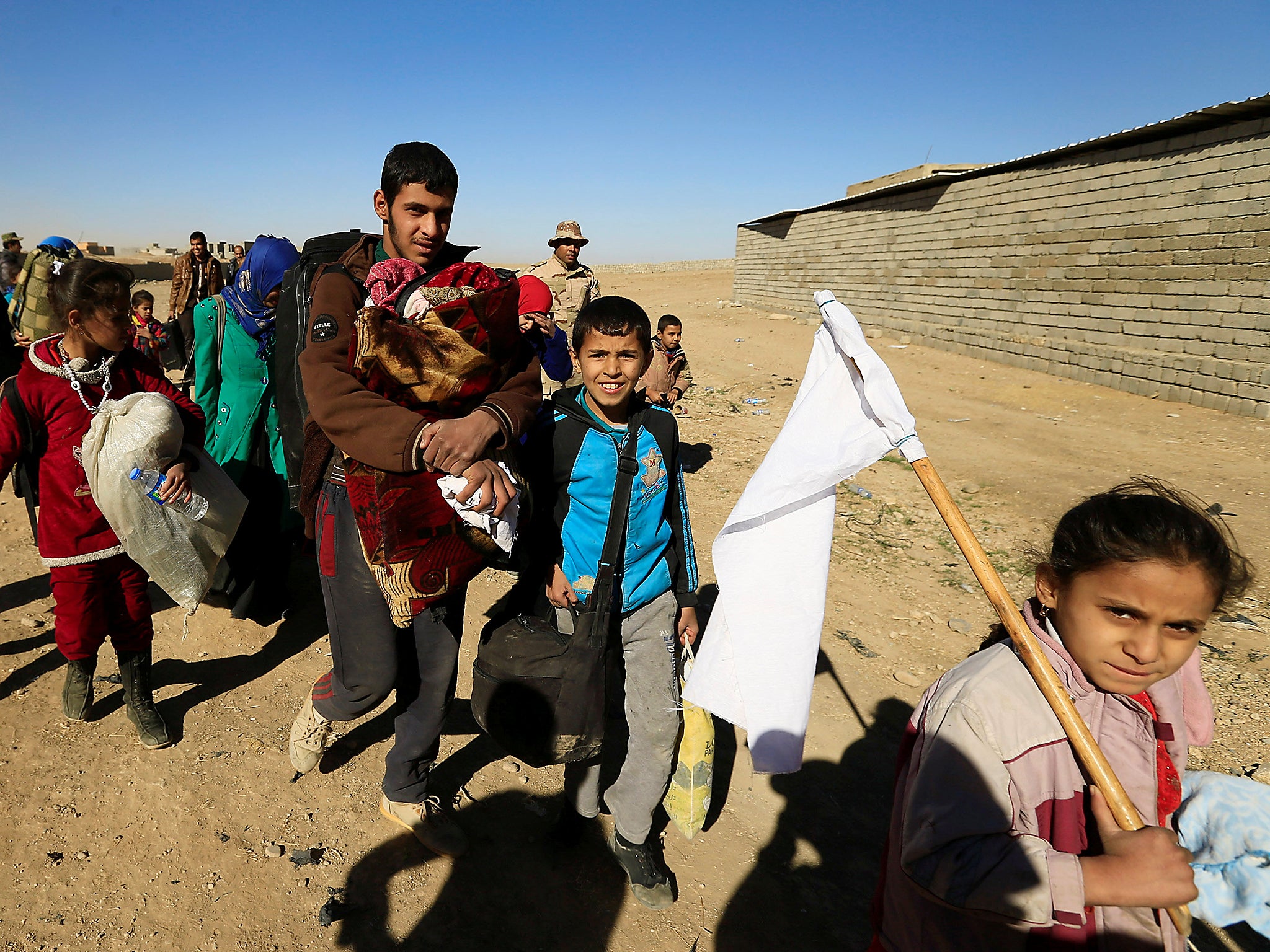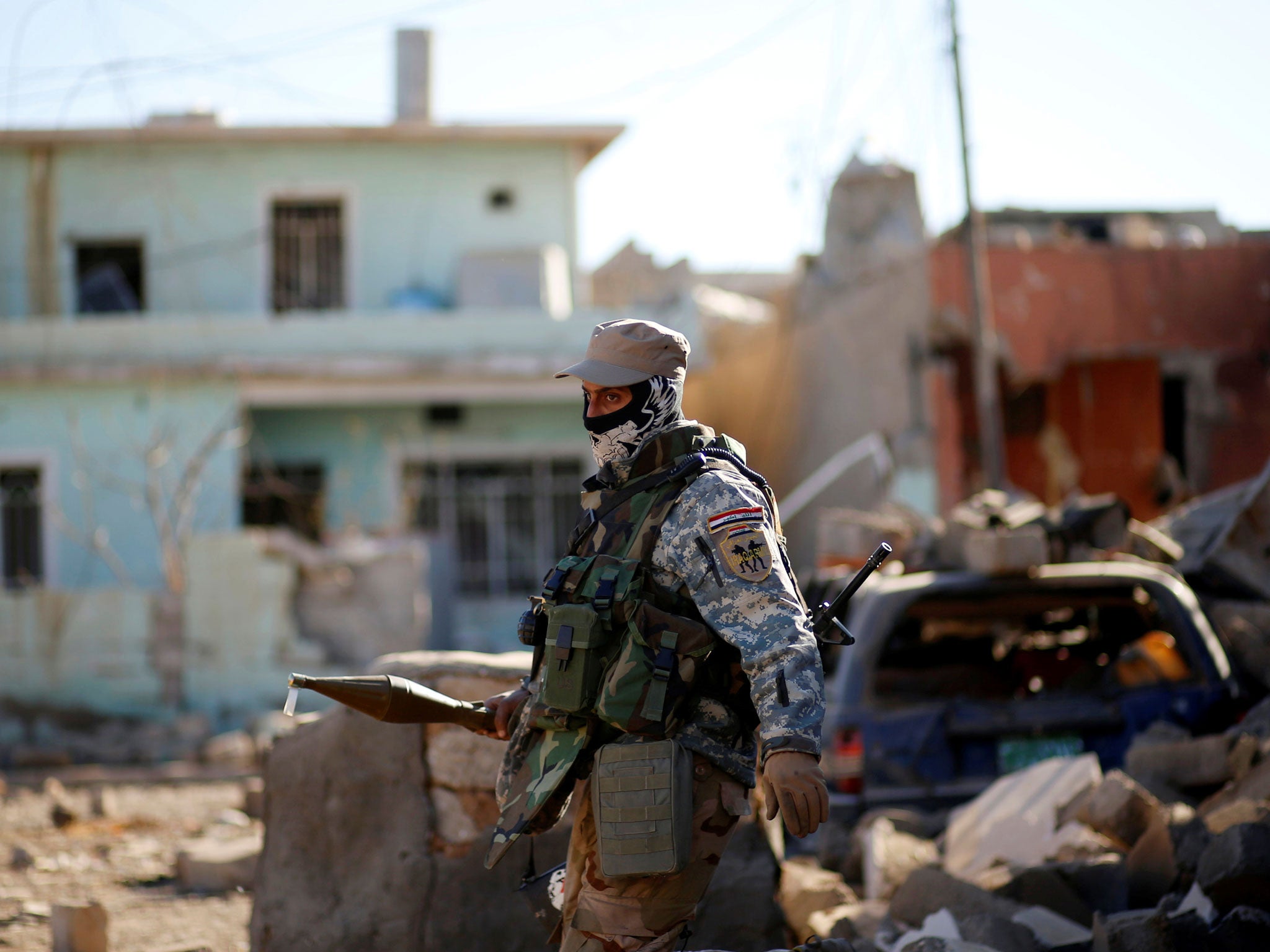'They wanted to cut off my head': Iraqis describe horror of life under Isis in Mosul
Families describe being forced to watch stonings and beheadings by Isis militants

Your support helps us to tell the story
From reproductive rights to climate change to Big Tech, The Independent is on the ground when the story is developing. Whether it's investigating the financials of Elon Musk's pro-Trump PAC or producing our latest documentary, 'The A Word', which shines a light on the American women fighting for reproductive rights, we know how important it is to parse out the facts from the messaging.
At such a critical moment in US history, we need reporters on the ground. Your donation allows us to keep sending journalists to speak to both sides of the story.
The Independent is trusted by Americans across the entire political spectrum. And unlike many other quality news outlets, we choose not to lock Americans out of our reporting and analysis with paywalls. We believe quality journalism should be available to everyone, paid for by those who can afford it.
Your support makes all the difference.Iraqis fleeing the assault on Isis’ stronghold of Mosul have revealed the extent of the group’s atrocities and repression as the city slips from its grasp.
The jihadis took less than a week to overrun Iraq’s third-largest city in June 2014, with leader Abu Bakr al-Baghdadi using its historic Great Mosque to declare his “caliphate” days later.
Isis fighters initially slaked their thirst for violence on government troops and security forces, massacring troops with suicide bombs and rounding up and executing local police officers, before dumping their bodies in mass graves.
Oday Mustapha Suleiman, a former soldier, knew of two police officers killed by militants, as well as his brother and spent most of his time inside his house for fear of being caught.
“They drove through the streets with a microphone, calling our names,” he told the Associated Press. “For 10 days I hid, just pacing between my room and the front door because they wanted to cut off my head.”
Azhar Yonas went into hiding after hearing his name was on an Isis list of police officers, estimating that a third of the 30,000 strong force was killed - tossed into a natural pit outside the city believed to hold thousands of bodies.
“They said they put them in the hole so they would not make the land unclean,” Yonas said.
The persecution soon turned to the city’s residents as Christian, Kurdish and Shia houses were marked out and the group started to enforce its hardline interpretation of Sharia law.
An estimated half of a million people fled the formerly cosmopolitan city in those first weeks, with those that left subjected to tightening surveillance and a punishing regime governing everything from work, to education and the methods of dress.
Infractions were punished by fines, flogging, amputations and death by a variety of gory execution methods including shooting, beheading, drowning, stoning and – reportedly – being roasted alive in a commercial oven.
Former residents told AP how Isis fighters rounded them up and forced them to watch a young woman being stoned to death on accusations of adultery – one of a number capital offences including “insulting” God, sorcery, blasphemy and homosexuality.
She was paraded blindfolded with her supposed lover through in Samah district in August before being murdered. As the group continued to lose territory in Syria, it seemed to be stepping up its vindictiveness.
"Still not dead," Samira Hamid recalled the militant pronouncing as he checked the woman's pulse after two stones were thrown, before the third and lethal blow to her head.
The man accused of being her lover was flogged 150 times and forced to go to Syria to fight for Isis. Another witness, Sarmad Raad, found recalling the killing nearly unbearable.
“I shut down,” the 26-year-old said, “I just lost my mind.”
Isis also took control of education, replacing learning with its own ideology and programmes to train up a new generation of jihadi recruits.
At the same time it cracked down on media, destroying satellite dishes and banning foreign television while pumping out its own propaganda showing the damage caused by “crusader” air strikes and success of the so-called Islamic State.
The Independent met Shaimaa, her baby son Adam and his five-year-old brother Arran at a refugee camp in Lesbos last year.
The family had taken five months to reach Europe, carrying with them just one rucksack carrying nappies and clothes, in the hope of starting a new life in Germany.
“The Isis men are terrifying,” Shaimaa said. “They control every aspect of your life, we couldn't even watch television.
“The children can't go to school, there's no water, no electricity, we can't work so we have no money.”
As the siege wore on, the Iraqi government cut off the flow of money it had been paying civil servants, and air strikes cut into Isis’ oil revenue and cash reserves.

Infrastructure broke down, electricity failed and communications were cut off for the vast majority of residents.
As Iraqi forces and allies close in on the city, Isis has been preventing people from leaving while hanging the bodies of suspected “spies” from street lamps to deter dissenters.
Rupert Colville, a spokesperson for the UN High Commissioner for Human Rights, said the United Nations had received continuous reports of extrajudicial killings, summary executions and atrocities during the offensive.
In one village outside the city, Isis tied six civilians to a vehicle by their hands and dragged them through the streets because they were related to an opposing tribal fighting, while in another village the bodies of 70 civilians were discovered shot dead inside their homes.
While forcing to move a group of civilians to relocate to use them as human shields, militants reportedly shot three women and three girls dead because they weren't keeping up.
“The victims were lagging behind because one of the children had a disability,” Mr Colville said. “She was apparently amongst those shot and killed.”
As Iraqi forces continued to advance on Tuesday, Shia fighters with the Popular Mobilisation Committees were clearing an area of land west of the city to prevent jihadis fleeing into the desert to prepare for counter attacks.
Residents who remain trapped said efforts to cut off routes to Syria had caused soaring fuel prices and food shortages.
One trader said told Reuters no fresh fruit or vegetables other than potatoes and onions had reached the city in the past week. “Residents are worried how they can get bread. If the siege continues at this level many people will die from lack of food,” he said.
As the world’s eyes continued to focus on the plight of besieged Aleppo as Syrian forces closed in on Tuesday, MPs urged the government to ensure the slaughter is not repeated by Western-backed campaigns against Isis territories.
Emily Thornberry, the shadow Foreign Secretary, warned that civilians in Isis-controlled cities were “just as vulnerable” to the effects of bombing and siege by British allies as those in Aleppo.
Join our commenting forum
Join thought-provoking conversations, follow other Independent readers and see their replies
Comments